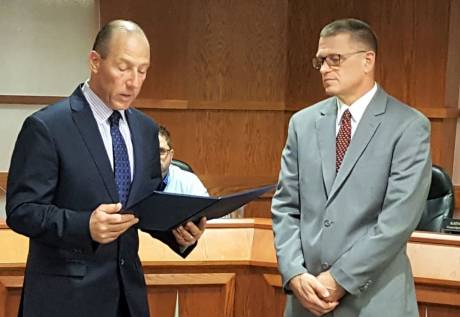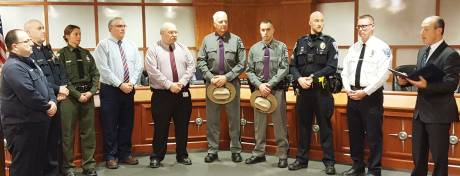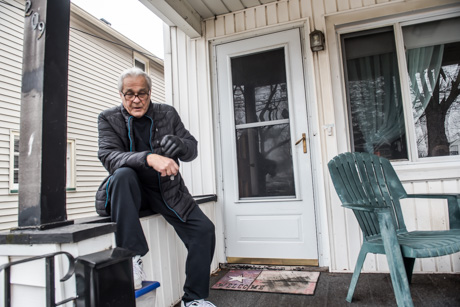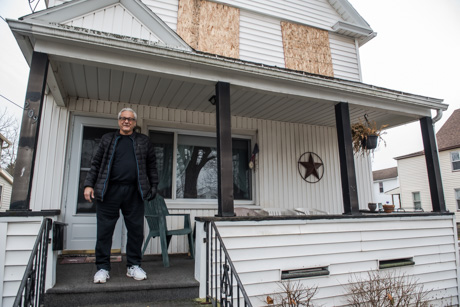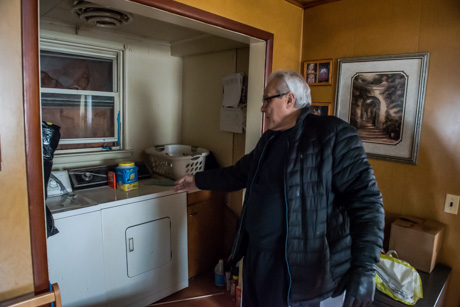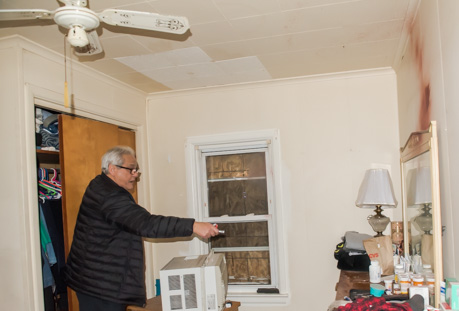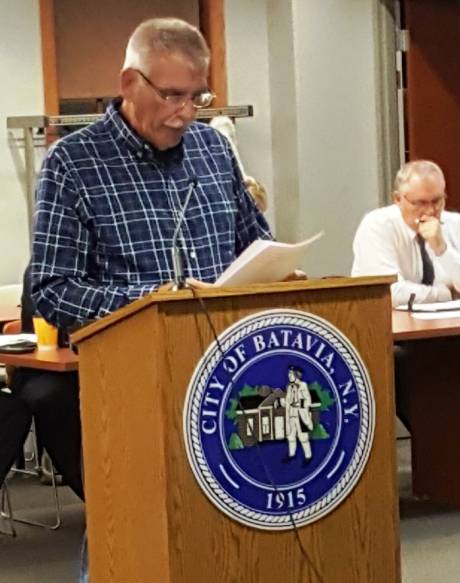Public comments concerning the condition of Falleti Ice Arena on Evans Street, the prospect of the City losing out on Video Lottery Terminal funds generated by Batavia Downs Gaming, and the lack of progress on the Ellicott Station project took center stage at tonight’s Batavia City Council Conference Meeting at City Hall.
“We need to invest in this facility to make the next 40 years as successful as the past 40 years,” said Batavia resident Michael Reich, who said he has been involved with programs at the ice rink for more than 25 years.
Reich mentioned the efforts of Jack Porter and Ronald Setzer in helping to make the rink a reality and bringing “a lot of smiles under that roof.”
“Thousands of families have gone through there … lifelong connections there and (a notable) economic impact,” he said. “But it’s 40 years old and it needs some work.”
He mentioned that the goal of the management company, Firland Management, was to make it “self-financing in the long term” and said there is $300,000 in a reserve fund.
“We’re in a strong position going forward,” he said, adding that he would be willing to be a part of a group or committee to work on a number of necessary improvements. “The time has come to do these things, (to make) incredible investments in our youth. It’s a phenomenal facility. Just help us.”
Council Member Paul Viele, who also is a hockey enthusiast, agreed with Reich.
“What can we do to help the rink? We can put money into Dwyer Stadium, why not the rink?” Viele asked.
Council President Eugene Jankowski suggested forming a group to clean and make minor repairs.
“A lot of things are just cleanup and maintenance things,” he said. “We’re compiling a list. We’ve got a long way to go … but we have some possibilities here.”
Council Member Rose Mary Christian asked how much was in the reserve fund – City Manager Martin Moore said that the amount would be addressed in the budget sessions – and Robert Bialkowski asked if Firland was meeting their obligations, to which Moore replied that Firland has one more year left on its contract.
Batavian John Roach spoke about Gov. Cuomo’s proposal to take the VLT money away from the municipalities, suggesting that the City should look to the Batavia Improvement District or Genesee County Economic Development Center to fund the Batavia Development Corporation if that comes to pass.
“The $70,000 (for the BDC) was supposed to be funded by VLT money,” he said. “If lost … I think the GCEDC could pick it up easily.”
He also questioned why the City gives $4,000 annually to GO ART!, when it used to be $2,500 to conduct the Picnic in the Park on July 4th.
“Let’s take back our $4,000,” he said. “It was never meant to be a permanent subsidy to a private group.”
He also asked Council to consider “getting a little more aggressive to clean up Ellicott Station,” the mixed-use development project that has seen little progress.
On the GO ART! situation, Council Member Patti Pacino said she didn’t have a problem with a $4,000 contribution – “It’s not like giving $24,000" – and noted that GO ART! leadership makes a request for funding every year.
The Ellicott Station state of affairs generated more comments from the Council and management, with Moore informing the board that code enforcement personnel have a “green light” to make sure code issues are addressed.
He said the developer, Savarino Companies of Buffalo, is on “a very short leash” but acknowledged that not much can be done until he finds out whether a New York State Homes and Community Renewal grant of several million dollars is approved (likely to take place in April or May).
Council Member Kathleen Briggs said the community’s patience is wearing thin.
“Put up or shut up,” she said, directing her comments to Savarino. “What is this short leash?”
Understandably, Council members are worried that the project might fall through.
“If he doesn’t get the grant, does he just walk away?” Bialkowski asked.
Moore responded by stating that Savarino said he has $800,000 to $900,000 invested in predevelopment, and is working with the GCEDC and BDC on the funding.
Jankowski said he thought the initial announcement by the BDC (made in 2016) was premature since funding streams had yet to be put into place, but said he remains optimistic.
“If he (Samuel Savarino) does come through, it will be well worth it,” he said.
In another development, Council heard a request from Eric Biscaro, owner of Classic Home Improvements and Armor Building Supply at 653 Ellicott St., to construct an auto service station on his property.
Currently, the location is zone I-1 (Industrial) and does not allow the operation of a motor vehicle repair shop. Biscaro went to the Genesee County Planning Board, where his request for a use variance was rejected, and now he's hoping that the City can come up with a way to make this happen.
“We’re looking to put up a small two-bay garage behind the Armor side (of the facility),” he said. “You won’t even be able to see it from the street.”
Public Works Director Matt Worth suggested that City officials conduct an internal review of the proposal to see if a zoning change is in order – “We’ve done a couple zone changes in the not-too-distant past,” he said – and report back to Council before its next meeting.
Because a zoning modification may be the only route, it would take several months since it means adopting a Local Law, which requires a public hearing. Any zoning change would affect all I-1 zones and expand the scope beyond a singular project.
Viele, speaking in elevated tones, expressed his disdain for the process.
“We should be able to help the guy out … why drag our feet,” he said. “It’s baloney.”
After a short discussion, Council agreed to let City staff conduct the review and report back before the next meeting. As it stands now, all service stations in the City are in areas that are zoned Commercial.
In other action, Council approved moving the following resolutions to be voted upon at its next Business meeting on Feb. 10:
-- Adoption of the Genesee County 2019 Hazard Mitigation Plan to serve as the City’s Hazard Mitigation Plan, a measure that would permit the City to receive federal pre-disaster mitigation funds.
“This allows us to piggyback (on Genesee County) and garner more funding with more people in the mix – in the event that monies become available,” Fire Chief Stefano Napolitano reported. “It gives us greater buying power by working with the county and other municipalities.”
Napolitano said the county’s Hazard Mitigation Plan has been reviewed and approved by the State Emergency Management Office and by the Federal Emergency Management Agency, and was adopted by the Genesee County Legislature in October.
-- Acceptance of a $25,481 STOP-DWI grant from Genesee County to be used throughout the year and a $22,500 with a professional services firm (to be announced) to facilitate the acceptance of a $300,000 New York Main Street grant as a match for private investments to undertake proposed building improvements within the Batavia Business Improvement District.
-- Sale of a 12- by 50-foot parcel of property next to Eli Fish Brewing Co. in Jackson Square for the company to expand their offerings to include outdoor dining. Matt Gray represented AGRV Properties Inc. at the meeting. The parcel has been appraised for $840, which is the price offered to the City by AGRV Properties.
-- Appointments of Lois Gerace to the Board of Assessment Review and Council Member Rose Mary Christian as marriage officer to have the authority to perform wedding ceremonies.
-- Tentative public hearing on the 2020-21 budget, including water rates, sewer rates and capital improvement fee, for 7 p.m. Feb. 24. The amount to be raised by taxes is $5.4 million, resulting in an increase in the property tax rate of less than 1 percent.
Photo -- Christopher Camp has his assistant police chief badge placed on his uniform by his wife, Stefanie, as Chief Shawn Heubusch looks on during promotion swearing-in ceremonies at Monday's City Council meeting. Matthew Lutey (detective sergeant), Mitch Cowen (sergeant) and Marc Lawrence (sergeant) also were sworn in.
